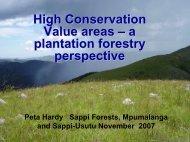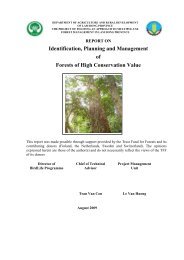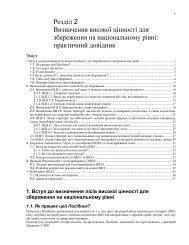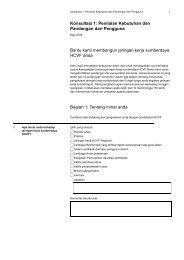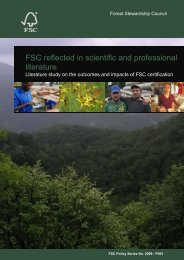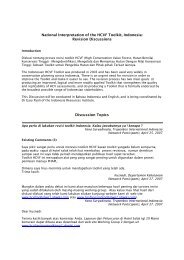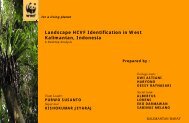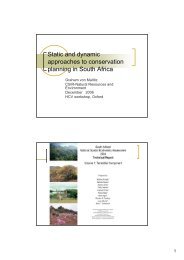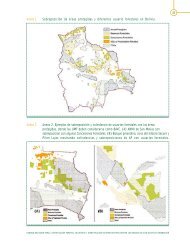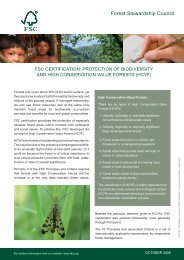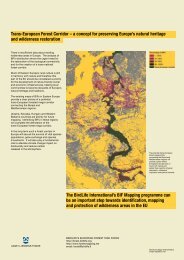Forests Sourcebook - HCV Resource Network
Forests Sourcebook - HCV Resource Network
Forests Sourcebook - HCV Resource Network
Create successful ePaper yourself
Turn your PDF publications into a flip-book with our unique Google optimized e-Paper software.
Property and Access Rights), overly complex laws and regulations<br />
biased against the poor (see note 5.3, “Strengthening<br />
Legal Frameworks in the Forest Sector), and transparency and<br />
stakeholder participation in decisions directly affecting their<br />
livelihoods. However, an increasing trend toward decentralization<br />
(both administrative and fiscal), coupled with increased<br />
willingness of governments to allow operation of multistakeholder<br />
processes, has created unique demands as well as<br />
opportunities for better and different forms of governance<br />
(see note 5.1, Decentralized Forest Management, and 5.2,<br />
Reforming Forest Institutions). These considerations have<br />
been complemented by the universal commitment to the Millennium<br />
Development Goals dealing especially with issues of<br />
equity and the rights of poor and indigenous forest communities.<br />
Thus, decentralization and participation are crucial<br />
issues that are extensively discussed in this sourcebook (see<br />
note 5.1, Decentralized Forest Management).<br />
A forest fiscal system is needed that, in its broadest terms,<br />
influences revenue flows in and out of the sector as well as<br />
income distribution across various stakeholder groups<br />
within the sector. A well-designed and well-functioning fiscal<br />
system is an important instrument with which to address<br />
sustainable resource utilization and equity and rural development<br />
issues, and to minimize the risks of corruption (see<br />
note 5.4, Strengthening Fiscal Systems in the Forest Sector).<br />
In addition, combating large-scale criminal activities<br />
requires targeted action to directly improve forest law<br />
enforcement so that criminals are apprehended and punished.<br />
Combating large-scale criminal activities would also<br />
include more fundamental changes to improve the broader<br />
governance environment in the forest sector and in society<br />
at large to help strengthen law enforcement efforts (see note<br />
5.5, Addressing Illegal Logging and Other Forest Crimes).<br />
In many countries, law enforcement capacity and expertise<br />
exists in other sectors and needs to be marshaled in new<br />
ways to support forest development. In others, specialized<br />
capacity needs to be developed within forestry agencies.<br />
Exploitation of new enforcement innovations and opportunities,<br />
made possible, for example, by the introduction of<br />
anti-money-laundering legislation, the adoption of the UN<br />
Conventions against Transnational Organized Crime and<br />
Corruption, and by other new legal and judicial innovations,<br />
will require new skills and capacity.<br />
FUTURE PRIORITIES AND SCALING-UP<br />
ACTIVITIES<br />
Support decentralization and devolution of forest<br />
management responsibilities. Decentralization and<br />
devolution based on the principle of subsidiarity, are means<br />
to promote more democratic and equitable management of<br />
forest resources and increase the contribution of the sector<br />
to poverty reduction. Decentralization and devolution<br />
processes can create imbalances and unforeseen negative<br />
consequences if they are not carefully managed and accompanied<br />
by sufficient capacity building, allocation of financial<br />
resources, and creation of mechanisms for downward<br />
accountability at the decentralized levels. Bureaucratic resistance<br />
to change at the central level, as well as powerful<br />
vested interests, can often swing the policy pendulum from<br />
decentralization and devolution back to re-centralization,<br />
reversing progress and resulting in incoherent policies and<br />
regulations.<br />
Protect the rights of and empower indigenous and<br />
local communities through governance reform<br />
processes. Specific attention should be given to using<br />
governance reform processes to protect the rights of and<br />
empower indigenous and local communities. This can prevent<br />
unintended and potentially adverse impacts on forestdependent<br />
livelihoods and traditional rights (see also note<br />
1.3, Indigenous Peoples and <strong>Forests</strong>, and chapter 12, Applying<br />
OP 4.10 on Indigenous Peoples).<br />
Continue to engage in institutional and legal system<br />
reforms in the forest sector. The World Bank, with<br />
its engagement in diverse sectors, helps governments tailor<br />
forest sector reform processes to the country context and<br />
effectively implement them. A model that works for a postconflict<br />
country (for example, Liberia or the Democratic<br />
Republic of Congo) may be very different from what is possible<br />
in a country in transition from a centralized, one-party<br />
governance structure to a democratic model (for example,<br />
the experience of the former communist countries of Eastern<br />
Europe). (See note 5.2, Reforming Forest Institutions,<br />
for discussion on key principles and structures.)<br />
Assist in enabling and designing fiscal system<br />
reforms that are economically and administratively<br />
efficient. Fiscal system reforms that are economically and<br />
administratively efficient allow for appropriate rent capture.<br />
As part of this process, the World Bank should assist governments<br />
in assessing the appropriateness of structuring<br />
forest fiscal systems to achieve secondary objectives, such as<br />
equity and sustainable rural development.<br />
Center FLEG activities at the country level around<br />
more effective integration of the work in the forest<br />
156 CHAPTER 5: IMPROVING FOREST GOVERNANCE



